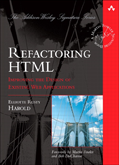Tuesday night I gave my RSS, Atom, APP, and All That talk to the Amateur Computer Group of New Jersey JUG in Scotch Plains. This is the seventh time I’ve given this particular talk, and I think last night I finally understood something about blogs that had eluded me up till now.
I’ve noticed for a while that blogging really represents a phase change in the Web. It has turned the Web from a read-only medium to a read-write medium. What I couldn’t figure out was why. There’s nothing technically different about using WordPress or Blogger compared to editing HTML and uploading the files to the server. Sure you don’t have to know HTML to blog; but there’ve been HTML editors that look like word processors for 10+ years now, and they didn’t lead to the explosion of content with blogs. FTP’s a bit of a pain for a non-techie, but there’ve been content management systems and editors that use HTTP PUT and/or hide the FTP client. None of them led to the explosion in content we see with blogging.
Nor is it that there’s one service that’s just particualrly well done that has allowed blogging to explode. If so, you’d see something like MySpace; that is, all the blogs on one site or platform instead of the plethora we have today (WordPress, Movable Type, Blogger, etc.).
But there is one thing that all these blog systems (and most others) have in common that none of the editors like DreamWeaver or Content Management Systems support:
User don’t have to pick their URLs.
(more…)

